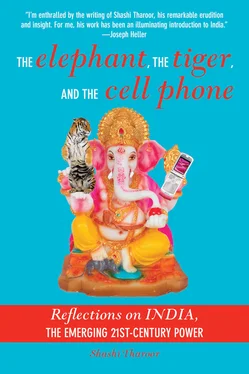I am indeed proud that I am a Hindu. But of what is it that I am, and am not, proud? I am not proud of my coreligionists attacking and destroying Muslim homes and shops. I am not proud of Hindus raping Muslim girls, or slitting the wombs of Muslim mothers.
I am not proud of those who assert the base bigotry of their own sense of identity in order to exclude, not embrace, others.
I am proud that Hinduism is a civilization, not a dogma. I am proud that India's pluralism is paradoxically sustained by the fact that the overwhelming majority of Indians are Hindus, because Hinduism has taught them to live amid a variety of other identities.
I am proud to claim adherence to a religion without an established church or priestly papacy, a religion whose rituals and customs I am free to reject, a religion that does not oblige me to demonstrate my faith by any visible sign, by subsuming my identity in any collectivity, not even by a specific day or time or frequency of worship. As a Hindu I am proud to subscribe to a creed that is free of the restrictive dogmas of holy writ that refuses to be shackled to the limitations of a single holy book.
I am proud that I can honor the sanctity of other faiths without feeling I am betraying my own. I am proud that Hinduism understands that faith is a matter of hearts and minds, not of bricks and stone.
I am proud of those Hindus, like the Shankaracharya of Kanchi, who say that Hindus and Muslims must live like Ram and Lakshman in India. I am not proud of those Hindus, like “Sadhvi” Rithambhara, who say that Muslims are like sour lemons curdling the milk of Hindu India. I am not proud of those who suggest that only a Hindu, and only a certain kind of Hindu, can be an authentic Indian. I am not proud of those Hindus who say that people of other religions live in India only on their sufferance, and not because they belong on our soil.
I am proud of those Hindus who realize that an India that denies itself to some of us could end up being denied to all of us. I am proud of those Hindus who utterly reject Hindu communalism, conscious that the communalism of the majority is especially dangerous because it can present itself as nationalist. I am proud of those Hindus who respect the distinction between Hindu nationalism and Indian nationalism.
I am proud of those Hindus who recognize that the saffron and the green on the flag hold equal importance. The reduction of non-Hindus to second-class status in their own homeland is unthinkable. It would be a second Partition, and a partition in the Indian soul would be as bad as a partition in the Indian soil.
For Hindus like myself, the only possible idea of India is that of a nation greater than the sum of its parts. That is the only India that will allow us to call ourselves not Brahmins, not Bengalis, not Hindus, not Hindi-speakers, but simply Indians. How about another slogan for Hindus like me? Garv se kahon ki hum Indian hain.
4. Of Secularism and Conversions
IN ALL THE RECENT DISCUSSION ABOUT HINDUTVA, the bogeyman has been the concept of secularism. Secularism is established in India's constitution, but acolytes of Hindutva ask why India should not, like so many other third world countries, find refuge in the assertion of its own religious identity. It is a reasonable question, which requires a reasonable answer — an Indian answer.
My generation grew up in an India that rejected the very idea that religion should be a determinant of nationhood. That was the basic premise of Indian nationalism. We never fell into the insidious trap of agreeing that, since Partition had established a state for the Muslims, what remained was a state for the Hindus. To accept the idea of India you had to spurn the logic that had divided the country.
This was what that much-abused term, secularism, meant for us. Religion is far too deeply rooted in all our communities to be wholly absent from Indians’ perceptions of themselves. So irreligion was not the issue; every religion flourishes in India. In The Great Indian Novel in 1989, I even argued the case for restoring dharma to its place in Indian public life. One reader, the retired director-general of police of Tripura state, Mr. B. J. K. Tampi, wrote to assert the broad meaning of dharma. “In Hindi,” he writes, “ dharma means only faith or religion. But in Sanskrit the word has a preeminently secular meaning of social ethics covering law-abiding conduct.”
Fair enough: in an afterword to my novel I had listed a whole series of meanings that have been ascribed to the term dharma —an untranslatable Sanskrit term that is, nonetheless, cheerfully defined as an unitalicized entry in many an English dictionary. (The Chambers Twentieth-Century Dictionary defines it as “the righteousness that underlies the law.”) I agree with Mr. Tampi that no one-word translation (“faith,” “religion,” “law”) can convey the full range of meaning implicit in the term. “English has no equivalent for dharma,” writes P. Lal, defining it as a “code of good conduct, pattern of noble living, religious rules and observance.” In his “The Speaking Tree,” Richard Lannoy actually defines dharma in nine different ways in different contexts. These include moral law, spiritual order, sacred law, righteousness, and even the sweeping “the totality of social, ethical and spiritual harmony.” Indeed, dharma in its classic sense embraces the total cosmic responsibility of both God and Man. My late friend Ansar Husain Khan, author of the polemical Rediscovery of India, suggested that dharma is most simply defined as “that by which we live.” Yes — and “that” brings me to my point, and to Mr. Tampi's.
“In fact the four ends of human life,” Mr. Tampi went on, “ dharma, artha, kama and moksha, are always mentioned in that order. The purport is that the pursuit of wealth and pleasure should be within the parameters of dharma and moksha (the final emancipation of the soul from rebirth through religious practices).” Mr. Tampi adds, citing Swami Ranganathananda: “The excessive Indian fear of rebirth has led to the neglect of true worldly dharma for the sake of an otherworldly moksha. It has made men unfit both in the worldly (secular) and spiritual spheres.” Now, I have never met the good Mr. Tampi, whose theological learning is all the more impressive in a policeman, but his analysis gladdens my secular heart. The fact is that, despite having done so much to attract the opprobrium of the Hindutva brigade, I do believe that dharma can be the key to bridging the present gap between the religious and the secular in India. The social scientist T. N. Madan has argued that the increasing secularization of modern Indian life is responsible for the rise of fundamentalism, since “it is the marginalization of faith, which is what secularism is, that permits the perversion of religion. There are no fundamentalists or revivalists in traditional society.” The implication is that secularism has deprived Indians of their moral underpinnings — the meaning that faith gives to life — and religious extremism has risen as an almost inevitable antithesis to the secular project. The only way out of this dilemma is for Hindus to return to the tolerant, holistic, just, pluralist dharma articulated so effectively by Swami Vivekananda, which embraces both worldly and spiritual duty.
After all, as Mr. Tampi pointed out, the Hindu's secular pursuit of material happiness is not meant to be divorced from his obedience to the ethical and religious tenets of his faith. So the distinction between “religious” and “secular” is an artificial one: there is no such compartmentalization in Hinduism. The secularism avowed by successive Indian governments, as Professor R. S. Misra of Benares Hindu University has argued, is based on dharma-nirpekshata (“keeping apart from dharma”), whereas an authentically Indian ethic would ensure that secular objectives are infused with dharma.
Читать дальше












